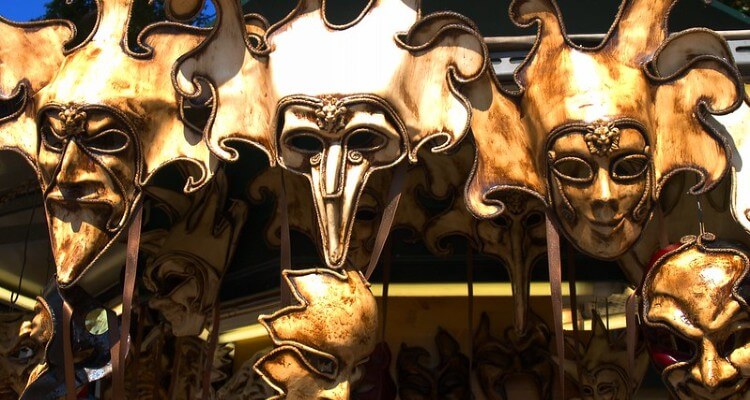Will Face Masks Inspire a New Sexual Revolution?
Concealing oneself can be liberating, but it also has its dark side.

“Man is least himself when he talks in his own person. Give him a mask, and he will tell you the truth.”—Oscar Wilde
What with our constant reminders of how to stay safe during the pandemic, it’d be easy for our stressed-out minds to forget that thousands of years before becoming an effective way to prevent the spread of disease, masks were magic.
A tad on the whimsical side? Maybe, but is there a better way to describe an item that, when worn, can free you—from being yourself?
As COVID-19 persists, an ability that has a pretty good chance of unfettering many of our wildest desires. All through the power of anonymity.
Freedom to express

Motivated by a growling stomach and a starkly empty fridge, I checked and double-checked my pandemic precautions before heading out to my local grocery.
There, life during COVID-19 was on full-display: hand-sanitizer stations, signs demarking how to be six feet apart from fellow shoppers, and, naturally, every face all-but completely obscured by a mask.
There was something else, though: while everyone was stringently covered up, many bodies weren’t. Sure, it was a warmish-day but needing to stay cool didn’t fully explain all that exposed skin.
And not just displayed but quite provocatively. And before you ask, no, this wasn’t a Walmart.
You could almost hear all the communal wheels turning: why shouldn’t I? It’s not like anyone can tell who I am.
While not always this provocatively expressed, the growing comfort in being facially invisible is getting more and more attention.
As in Samantha Matt’s tweet, which was referenced in an article for the, tweeted:
“Masks protect you from coronavirus yes, but they also protect you from running into people you know in public. Add sunglasses and you are literally in disguise. It’s safe to do anything, anywhere, even in your hometown. This is my dream.“
All this is nothing new to researchers, who’ve studied for decades the allure of being unrecognizable and what can happen when people feel free of daily societal constraints.
If that last bit sounds scary, then it probably won’t help that a lot of our understanding of this phenomenon comes from that spooky time of year.
Unmasking our dark sides
In 1960, Edward Diener and his team of researchers used Halloween to test the moral compasses of trick-or-treater. They watched whether or not the subjects would steal candy if their faces were hidden behind masks.
The results were disturbing, to be blunt about it. Diener found that because no one could tell who they were, as he puts it in his paper’s abstract: “Significantly more stealing was observed under conditions of anonymity.”
Technically, this is called deindividuation, and there’s ample evidence it gets way worse when you couple this social invisibility with choosing, or being coerced, into assuming a predetermined role. A mask, if you will.
Famously, or infamously it’d be more accurate to say, Stanford professor Philip Zimbardo’s prison experiment, where his test subjects were segregated into either guards or prisons, demonstrated how nightmarishly bad this can go wrong.
Sobering to be sure, but while this is an undeniable part of human nature, it doesn’t mean social anonymity invariably leads to nightmare scenarios like Zimbardo’s.
Instead, wearing a mask can be the opposite: a way to explore and affirm who we are.
Revealing sexual identities

Talk Internet and you’ve got to mention trolls: those irritating if not outright malignant so-and-sos who, emboldened by invisibility, have been pestering us since practically the first line of code was written.
But they have their uses. For instance, here they perfectly fit the kind of toxic deindividuation Diener studied. But despite their egos, they aren’t the entirety of the Internet. For all of their acting out, there are millions of others who, because they are safely anonymous, can comfortably express who they are—and what they enjoy sexually.
Take this and expand it outwards into our pandemic world of masks and you can see how though there’ll always be the danger that some might use having their face covered to act on their worst impulses others will instead use it to celebrate their gender preference, their orientation, or they’re beautiful bodies.
Who knows where all this could lead us? As we get more and more into life during quarantine, with it sliding steadily towards “this is just the way things are going to be for a long time,” people might gather for exhibitionism/voyeurism parties.
There they’d dance, prance, and sexually show off what nature gave them while remaining a safe six feet apart. Add in virtual reality or video conferencing and our party goes world-wide.
We’ve already looked at how masks are getting kinky, so why not postulate this trend by imagining this freedom of erotic expression graduating to our entire bodies: a joyously wild fashion parade of color, fabrics, and unashamedly exposed skin.
With looking good, we could also feel good: guilt and shame washed away by no longer fearing what others might think of you as, behind your mask, you’re nicely safe and secure.
Cosplayers and drag performers are already intimately familiar with this, often feeling a deep personal kinship to their favorite characters. In this spirit, there might see masks widely used to manifest entirely new erotic personas: giving us a chance to put not one, but many faces forward.
We might even see a new offshoot of BDSM, where a potent new aspect to submission all hinges in willing unveiling your most inmate self: your bare face.
Naturally, we’ll have to be careful—the dark side of deindividuation and all that—but in our over-excitedness doing something tragically reckless. Being optimistic, though, as we get familiar with this new world we’ll no doubt begin to build in self-imposed limitations to keep things from getting too out of hand.
There’s also the important question of consent, as though it’ll be thrilling to display yourself while hidden behind your COVID-19 mask, folx around you may not have agreed to participate in your exhibitionism.
A specifically designed party, where everyone knows what they’re getting into—or clothing out of—would solve a lot of this, of course.
Facing tomorrow together
Steadily emboldened by anonymity, longing to sexually connect with other people—even if we have to stay away from them, discovering that though masks obscure our faces they also free us to be who we are, the pandemic might, it’s own weird way, help us mature as a species.
But only if we don’t give in to ignorance and fear, that is. So, no matter how bleak things might appear, stay educated, take care of yourself and those around you, help those who can’t help themselves, try to stay optimistic, and no matter how it makes you feel, never go anywhere without your mask.
Image source: Naval S, Harikrishnan Tulsidas, istolethetv

















